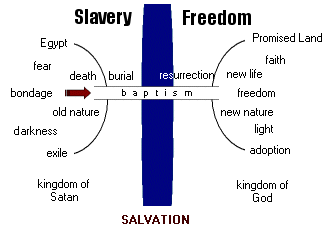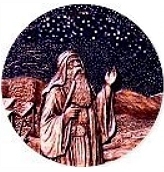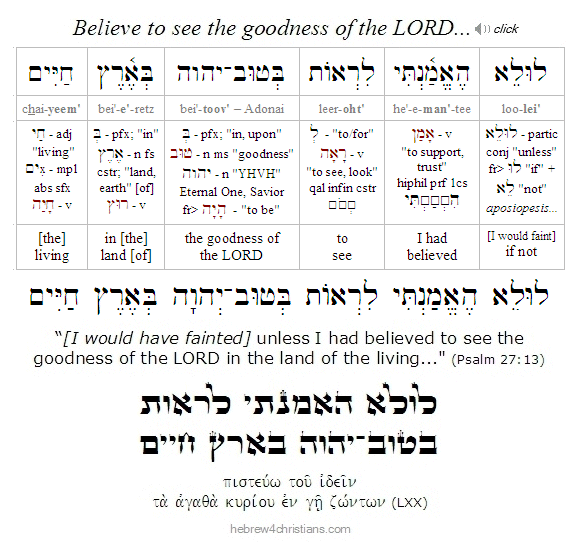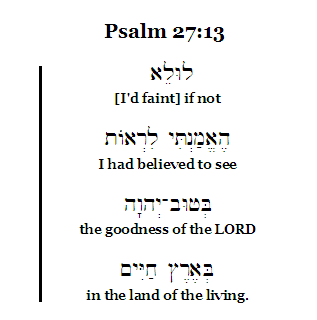|
In parashat Lekh Lekha Abram is called ha-ivri (הָעִבְרִי) - "the Hebrew," a term that means "one who has crossed over" (עָבַר) from another place. Rashi literally identifies this "other place" as Ur Kasdim (אוּר כַּשְׂדִים), located east of the Euphrates River, though the midrash (Genesis Rabbah) spiritually identifies it as the realm of idolatry: "The whole world stood on one side, but Abram crossed over to the other." Abram separated himself from a world steeped in idolatry and polytheism by worshipping One God who is the sole Creator of all things.... Understood in this way, being "Hebrew" means being regarded as an "other," a "stranger," or an "outsider" to idolatrous worldly culture.
Various midrashim tell the story about how Abram came to understand the truth that there is only one God who is Creator of all. For instance, when he was born, Abram's mother hid him in a cave. She was afraid that the evil king Nimrod would kill her son because prophets had warned that he would triumph over Nimrod. Guarded by the angel Gabriel, young Abram first worshipped the stars as gods until they were obscured by the Sun. Then he declared that the Sun was god until it set and the Moon took its place. Clouds then covered the Moon, showing Abram that the Moon was not a god either. At last, Abram understood that there was one supreme God would ruled over all the forces of the universe. (Later, after the danger had passed, young Abram rejoined his family.)
A midrash relates that Abram's father Terach sold idols for a living in the city of Haran. But Abram had long since realized that idol worship was foolishness. One day when he was asked to watch his father's store, Abram took a hammer and smashed all the idols - except for the largest one. His father came home and demanded to know what happened. Abram explained that the idols all got into a fight and the biggest idol won. When his father objected that this was impossible, Abram said, "Aha! So you agree with me that idols are powerless! My father, there is only one true God, and this God cannot be shaped with human hands..." Terach was angry but understood that his son had discovered the great truth of ethical monotheism.
Lekh lekha (לך־לך) literally means "go for yourself" (lit. "walk [הָלַךְ] for yourself [לְךָ]"). Rashi states that it means "Go for your own benefit," though the Chassidic teachers interpret it as "Go to yourself" (i.e., begin your own journey back to God). At any rate, it's clear that the phrase is an invitation by God to venture ahead -- to go forth in faith... Go forth and risk everything for the sake of God's promise.
"Go forth ... I will show you" (Gen. 12:1). Note that the LORD spoke to Abram and invited him to forsake his ancestral homeland for the promise of God. But note further that it was only after Abram made the long journey to the unknown land of Canaan that God appeared to him to him by the oaks of Mamre saying, "To your offspring I will give this land" (Gen. 18:1). Abram did not believe the promise because he saw God; he was only able to see God after he had walked in faith. First Abram heard the message, and later -- after he acted on his faith -- was he enabled to see more... מַעֲשֵׂה אֲבוֹת סִימָן לַבָּנִים / ma'aseh avot siman labanim: "The deeds of the fathers are signs for the children." The pattern is therefore given: First Abram heard the message, and later - after he acted on his faith - was he enabled to see more. This is the deeper meaning of being "Hebrew," one who crosses over from the realm of the dead to the realm of the Living God...
 |
As a matter of textual gematria, regarding the promise to make Abraham's name great (Gen. 12:2), the sages note that the total number of Hebrew letters in the names of the three patriarchs Abraham (אברהם), Isaac (יצחק), and Jacob (יעקב) is 13. Likewise the total number of letters in the names of the three matriarchs Sarah (שׁרה), Rebecca (רבקה), Leah (לאה), and Rachel (רחל) is 13. Furthermore 13 is the numeric value for the word echad (אחד), a word that means "unity" and represents the 13 attributes of God's Mercy (Exod. 34:6-7). The combined letters of the patriarchs and matriarchs therefore totals 26, the same numeric value (in gematria) as that for the Name of God (i.e., YHVH: יהוה).
Hebrew Lesson:
Psalm 27:13 reading (click):
<< Return to Lekh Lekha
|





